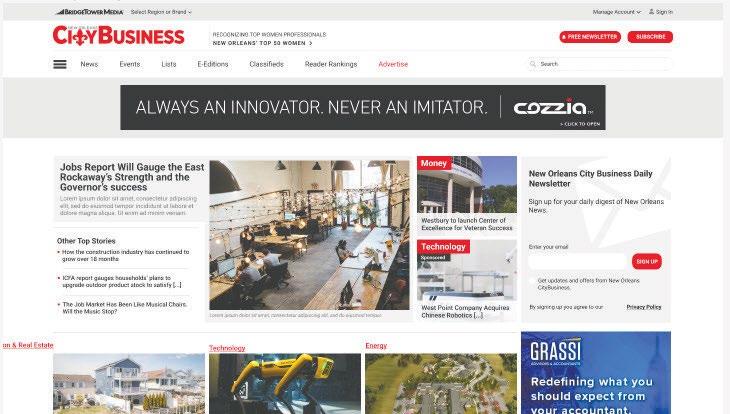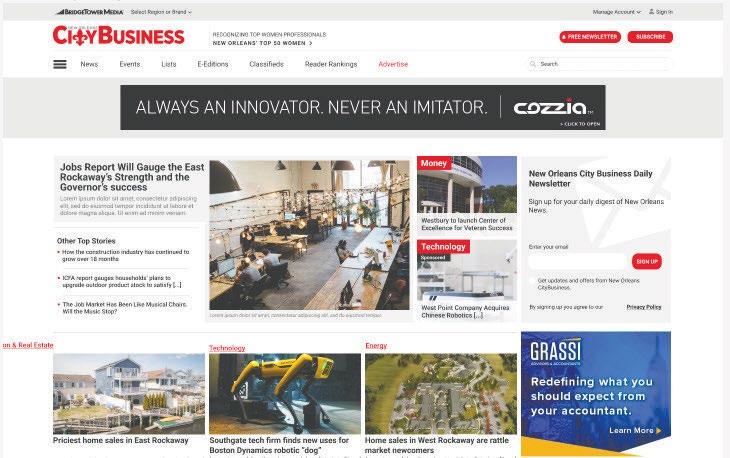
















































IN PRINT. IN DIGITAL. IN PERSON. Expertly Focused On Today’s Legal Professional.
130 North McDowell Street, Unit B, Charlotte, NC 28204 (704) 377-6221 • FAX(704) 377-4258
E-mail: service@bridgetowermedia.com • Circulation: 1-877-615-9536
Managing Director/Publisher
Susan A. Bocamazo, Esq., sbocamazo@lawyersweekly.com
n EDITORIAL Editor
Ross Chandler rchandler@lawyersweekly.com
Digital Media Manager
Scott Baughman sbaughman@mecktimes.com

n CIRCULATION
1-877-615-9536 service@bridgetowermedia.com
n ADVERTISING Advertising Account Executive
Sheila Batie-Jones sbatie-jones@sclawyersweekly.com
n ACCOUNTING & ADMINISTRATIVE Business Manager
Kelly Olson kolson@bridgetowermedia.com
n ART & PRODUCTION
Creative Director
Melanie Bingham
Project Management
Jordan Mazuranic
Production Specialist
John Reno Director of Production Services
Bradley Redmond
SCLAWYERSWEEKLY
South Carolina Lawyers Weekly (USPS #020216) is published Monthly with General Statewide Circulation by South Carolina Lawyers Weekly at 130 N. McDowell St. Unit B, Charlotte NC 282042411. (919) 829-9333, (800)-876-5297.
Periodicals postage paid at Charlotte, North Carolina 28228-9998.
POSTMASTER - Electronic Service Requested. send address changes to South Carolina Lawyers Weekly, Subscription Services, P.O. Box
1051 Williamsport, PA, 17703-9940
To place orders, temporarily stop service, change your address or inquire about billing: Phone: (877) 615-9536 or go to: https:// SClawyersweekly.com/subscribe/for a new subscription or https://SClawyersweekly.com/manage-accountfc/ to manage your account and to renew.
To submit subscription payments by mail: Subscription Services P.O. Box 1051 Williamsport PA 17703-9940
©2023 BridgeTower Media. Material published in South Carolina Lawyers Weekly is compiled at substantial expense and is for the sole and exclusive use of purchasers and subscribers. The material may not be republished, resold, recorded, or used in any manner, in whole or in part, without the publisher’s explicit consent. Any infringement will be subject to legal redress.
BridgeTower OpCo, LLC d/b/a North Carolina Lawyers Weekly Media is an equal opportunity employer.
COVER STORY
p4 | NIL: Lawyers find new clients among college athletes
PROFILE
p6 | Counsel keeps up the fight for reproductive rights
5 QUESTIONS
p8 | Killoren leads South Carolina Association for Justice
OPINION DIGESTS
p12 | Roundup of rulings on state and federal appeals
LEADERSHIP IN THE LAW 2023
p17 | State’s outstanding lawyers are recognized
VERDICTS & SETTLEMENTS
p28 | The latest roundup of South Carolina legal cases.
LAWYERS IN THE NEWS
p29 | New associations, promotions and honors.
CAROLINA PARALEGAL NEWS
p33 | AI finds role in education, legal work
It’s the season when many lawyers pack up their families and head to college — not only to visit a child studying there but also to enjoy an afternoon or evening of football.
But this year’s game has taken a different turn. Lawyers won’t be watching just touchdowns and interceptions on the field; they’ll also be looking at prospective clients. As Heath Hamacher reports in this month’s cover story, football players and their peers on other sports squads can now monetize their name, image and likeness, a concept summed up as “NIL,” and lawyers will lead them through doing so.
Chandler
The details are in Heath’s story, and I’ll let you find them there. The point I want to make is that Heath’s reporting is what this magazine wants to emphasize — stories that will help you better serve your clients and grow your practice. Our reports seek to answer and explain what is new, what has changed, and what are the potential challenges and rewards of selected issues that lawyers face.
That’s not to say the magazine will take on the dry tone of a law review or policy journal. We still want to make sure you know who has joined which firm or earned a promotion (see the Lawyers in the Law feature), who has won a verdict in That Big Case (Verdicts & Settlements), and who has an idea or a success that merits a stand-alone story (Five Questions With …). The goal is that the magazine will be equally informative, interesting and engaging.
Two years after the U.S. Supreme Court decided that college athletes can be compensated for the use of their “name, image and likeness,” lawyers who handle NIL cases are still defining the specifics of practicing in that field.
NIL law effectively became a field of practice after the court’s unanimous decision in NCAA v. Alston. The 2021 case noted the “highly profitable” and “professional” nature of college athletics, particularly basketball and football.
The decision was much to the chagrin of the NCAA, which has long pointed to “amateurism” — a term inconsistently defined by the organization — in contending that paying student-athletes could erode the distinction between collegiate and pro-
fessional sports. As the high court noted, American colleges and universities have always “had a complicated relationship with sports and money.”

The Supreme Court’s ruling in no way addresses every associated issue — courts are also considering whether student-athletes are employees, for example — but did find that NCAA rules limiting education-related compensation violate the Sherman Antitrust Act.


Attorneys are clear that despite the nuances associated with new NIL regulations and law, it is not a new area of law, per se.
“I feel like it ties into so many different areas of law,” said Jessica Visser, a partner with Varnum in Grand Rapids, Michigan, who co-chairs the firm’s NIL practice. “IP (intellectual
property) attorneys are definitely important in this space, contract attorneys. … If you’re representing student-athletes, I would say a trust and estates attorney would be a really good person to contact. … I think it’s really very unique and doesn’t fit neatly into any other existing area of law.”
Michael Rueda, partner and head of U.S. sports and entertainment at Withersworldwide in New York, agreed, saying he gets a little suspect when he hears someone refer to themselves as a “NIL lawyer.”

“That’s not really a thing. … There are different elements to every deal,” Rueda said. “It’s highly dependent on how a deal is structured. … It’s an intersection of contract law, intellectual property law. … It can involve other things such as forming new entities. Securities laws could be at play. You could be an IP lawyer, a corporate lawyer, a commercial lawyer; there are different elements to every deal.”
In other words, there are no new principles at work in NIL law, only a difference in application.
Once upon a time, student-athletes were not allowed to accept even a dollar for their autograph or an appearance. Today, while many NIL deals are for nominal amounts of money or goods, upper-tier athletes can make hundreds of thousands of dollars. In the United States, “NIL rights” is a slang term for the right of publicity, which prevents the unauthorized commercial use of an individual’s name, image, likeness or other recognizable aspects of his or her persona. It bestows the exclusive right to the individual to license the use of identity for commercial purposes. These rules allow student-athletes to profit from their personal brands through certain services and products using social media, personal appearances, sponsorships, autographs and endorsements, among other avenues.
As Rueda put it, NIL is not a novel concept, simply “the right for an individual, in this case, a college athlete, to monetize their publicity rights.”
After the Alston decision, the NCAA enacted an interim NIL policy allowing student-athletes to be compensated. Today, Rueda said, that guidance is loose.
“It sort of punts a lot of rulemaking authority and control over the situation to individual schools and confer-
ences and states,” he said. “It allows for more disparity among the rules, and the lack of consistency could lead to problems. That’s why initiatives are being pushed in Congress for more comprehensive rules, which I think is challenging.”
So far, more than a dozen bills have been proposed, but none has so much as received a debate among a full Senate or House committee, the initial step in the process of becoming law. William Palmer of Kaufman & Canoles in Norfolk, Virginia, said that the push for legislation is important because the lack of uniformity across states has created problems for multistate entities such as collegiate conferences and NCAA enforcement efforts.
“A few bills were recently introduced in July,” Palmer said. “It is unclear if, and in what form, they will survive, but most authorities think it is just a matter of time before Congress passes something addressing NIL.”
Before college student-athletes could profit from their NIL, Curry Sexton was an all-Big 12 wide receiver at Kansas State University. Today, he is an attorney with Seigfreid Bingham in Kansas City, Missouri, who works heavily with Division II conferences and institutions, providing them with valuable insight into NIL practices.

Sexton called the NCAA’s interim policy a bare-bones one that essentially prohibits two things: being paid to play for a school or receiving financial incentives to sign with or remain at a school. While some states, such as Kansas, have no NIL laws, others, including Missouri, make concerted efforts to pass the most progressive laws.
“The NCAA has indicated that they
may implement some more extensive NIL laws in the near future, while at the same time making a strong push for uniform federal NIL legislation,” Sexton said. “Despite several federal NIL deals being presented over the last two years, federal legislation doesn’t appear to be on the immediate horizon.”
To date, more than 30 states have enacted laws. They include South Carolina, where Attorney General Alan Wilson said in 2021 that the state’s legislation on NIL “… ensures fairness to our athletes, which is a very good thing. The law should immediately go into effect. This law provides guardrails to protect student-athletes so they can benefit financially without being taken advantage of.”
In North Carolina, Gov. Roy Cooper issued a three-page executive order one day after the NCAA rule change went into effect. He noted in part that allowing student-athletes to receive compensation for their NIL will be particularly beneficial to student-athletes of color, helping “alleviate racial inequity in intercollegiate sports” and “prevent the State of North Carolina from being at a competitive disadvantage in regard to enrollment at postsecondary educational institutions within the state.”
At Withersworldwide, Rueda’s sports and entertainment practice focuses on advising athletes, entertainers, influencers and artists on issues such as brand management, contracts and investments.
“These types of deals are things we do all the time,” Rueda said. “When it became possible for student-athletes to exploit their own rights, my biggest concern was making sure that these student-athletes got as much information about what these opportunities are like and what the risks are.”
Rueda added that there has been a
Behind Susanna Birdsong’s mild voice stands a steely resolve.
The counsel for Planned Parenthood South Atlantic speaks clearly and unequivocally about her job and what she sees as its importance to herself and others.
“The issue of reproductive freedom and bodily autonomy was deeply personal to me,” she said about what drew her to the position. “It felt like the right job and the right time for me.”
But despite her title, Birdsong’s work as the affiliate’s lawyer is not what many people would expect. For one thing, she is not its courtroom presence.
“I’ve never been a litigator,” she said. Instead, she works in policy-driven areas. At one time, she served as its registered lobbyist, but her official title now is general counsel and vice president of compliance.
“My priority work over the last year has been to support our health care providers and support staff,” she said, helping them to understand changes in laws such as North Carolina’s Senate Bill 20.
Passed this spring over the veto of Gov. Roy Cooper, the bill limits abortion to not later than the 12th week of pregnancy, requires patients to make an extra visit to a clinic before undergoing an abortion, and
• Place of birth: Jackson, Miss. “I consider Wilkesboro, North Carolina, my hometown.”
• Education: Bachelor’s in English and history, 2003, and Master of Social Work, 2008, University of North Carolina at Chapel Hill; Juris Doctor, 2013, American University Washington College of Law.
• Firms affiliated with: Two-year legal
VIDEO: See Susanna Birdsong explain how her previous legal work prepared her to serve as counsel for Planned Parenthood South Atlantic in a video at nclawyersweekly.com or by scanning the QR code here.

mandates the clinic’s use of a state-approved script to convey certain information to them.
“The law prior to that had been 20 weeks,” she said, until the General Assembly “stripped eight weeks of access.”
She also has been involved in a seesaw fight over abortion in South Carolina.
After Roe v. Wade, the 1973 U.S. Supreme Court case that legalized abortion, was overturned in 2022, South Carolina legislators passed a law banning the procedure after the sixth week of pregnancy. Planned Parenthood South Atlantic sued that year in state court, and the South Carolina Supreme Court upheld an injunction that blocked the law.
“The justices said that a six-week abortion ban was a violation of South Carolinians’ right to privacy,” Birdsong said.
But the fight continued when state legislators again passed a similar law. Planned Parenthood South Atlantic sued again, but there was a key difference.
“The composition of the (Supreme Court) had changed in the meantime,”
fellowship, National Women’s Law Center in Washington, D.C.; senior policy counsel, American Civil Liberties Union of North Carolina.

• Civic engagement: “I am a busy mom of three daughters, and I coach Girls on the Run for them. I also am an adjunct professor at the Sanford School of Public Policy at Duke.”
she said.
Oral arguments were heard in June 2023; the South Carolina Supreme Court upheld the law in a ruling issued Aug. 23.
Planned Parenthood South Atlantic has no cases in Virginia open now.
Her ties to Planned Parenthood go back to her college years at the University of North Carolina at Chapel Hill, Birdsong said, explaining, “It has been an organization I felt aligned with.”
Retail politics helped cement the tie. A first-time mother living in Washington, D.C., she volunteered to help Planned Parenthood in the 2013 state election cycle in Virginia. Birdsong even took her daughter with her while canvassing door to door on behalf of legislative candidates.
“I think becoming a parent made me more resolute in my support for reproductive freedom,” she said.
By the time she moved back to North Carolina in 2015, she was working for the American Civil Liberties Union. The position had her working alongside Planned Parenthood South Atlantic, and she moved over to the affiliate in January 2020.
Planned Parenthood’s focus was appealing.
“I really wanted to deepen my work in a single issue,” Birdsong said. “The ACLU is a multi-issue organization.”
• First job: “My first paying job, outside of babysitting, was at a little gift shop in Wilkesboro called The Cricket Box.”
• Biggest career challenge: “I have worked since moving back to North Carolina for progressive organizations, on the progressive agenda. The state political climate has made that challenging.”

iTracs helps you manage trust-account-related risk through ongoing account reconciliation, account activity monitoring, and daily reporting. Gain the peace of mind that comes from knowing your trust account is secure.
The iTracs platform automates daily account reconciliation and includes transaction monitoring, activity alerts, built-in reporting, and Positive Pay options. Professional account managers provide valuable customer support and assistance, lead product implementation, and deliver training. Courteous, knowledgeable, and responsive, they serve as partners in analyzing and managing your trust account.
iTracs services don’t stop with the software. Account clean-up, audit preparation, consulting, and other services are available.
We don’t believe in “one size fits all.” We listen first. Then we develop customized, innovative solutions that meet your ongoing business needs.
Several tools, including Positive Pay options, provide maximum visibility into your trust account activity and alert you to possible fraud in time for you to act.
iTracs client onboarding and user training are second to none. Training plans, including Positive Pay automation training, are customized to meet your needs. Services are implemented quickly and efficiently.

Fulfillment of compliance requirements are not easily outsourced – but we can help! iTracs reinforces best practices and has built-in protocols that assist you with meeting regulatory compliance requirements.
No need to wait until month end. With iTracs, your reconciliation status is confirmed daily from wherever you may be, including from your mobile device!
Compassionate counsel and aggressive advocacy are two key values for Tom Killoren Jr.
The KD Trial Lawyers partner says what he likes most about the law is that it applies equally to everyone; someone with few means has access to the same judicial system as large corporations.

At least in theory. There is still work to be done to ensure that the little guy is heard, and Killoren is part of that effort. In August, the Spartanburg attorney became president of the South Carolina Association for Justice, which
seeks to strengthen the civil justice system and protect the rights of individuals.

“It is a great honor to lead an association that is determined to expand judicial access and ensure that the rights of the underdog are heard and preserved,” Killoren told the association’s members. “We
are fearless advocates for those who have been harmed by others, and we aim to protect the rights of the individual to seek recourse in open and fair courtrooms.”
Killoren brought nearly 30 years of courtroom experience to the role. After earning his law degree in Chicago in 1994, he sharpened his trial skills in criminal prosecution in Illinois before shifting to personal injury cases. For the past 22 years, he has been a successful personal injury attorney in South Carolina. Lawyers Weekly spoke to him to learn how he will use his experience and mindset to reach his goals at SCAJ.
What personal and professional experiences best prepared you for becoming president of the South Carolina Association for Justice?
A. Trying lawsuits and representing people who need help and learning compassion for my clients who suffered loss or had been injured and carrying that experience over to the association to help the association succeed.
In announcements of your election, you were quoted as saying that you want to strengthen the integrity of the state’s judicial system through education and effective action, expand judicial access, and ensure that “the rights of the underdog are heard and preserved.” What practical steps can you take to make those happen?
A. I think it’s important, this year with the SCAJ, that we take steps to promote access to justice for those who don’t have access to the court system. It’s going to require efforts on behalf of the association and the South Carolina Bar Association to make sure that the funding is available, and the volunteers are available to help people that couldn’t ordinarily get a lawyer or get access to the court system.
You formerly served on the association’s political action committee. How can the association most effectively lobby the South Carolina General Assembly as a whole, its members individually, Gov. Henry McMaster and the South Carolina Bar to meet the association’s goals?
A. The best thing we can do is explain our issues to the General Assembly and communicate our issues to them in a thoughtful and open manner and engage in frugal discussion with them about our issues. We find the General Assembly is always receptive and open and willing to talk to us. And we’re lucky that there is a number of lawyer-legislators that we can talk to, and we’re also lucky that we have a lot of legislators that are really dedicated to the state of South Carolina and what they do.
Your biography at SuperLawyers.com says that you have represented people “who have suffered economic and noneconomic harm due to the negligence or recklessness of other parties.” What case most stands out to you as to when you were best able to undo that sort of harm?
3 5 4
A. I don’t know if there’s a best case where I was able to undo it, but one of the cases that we worked on was the 2013 miniature train collision in Spartanburg that caused injuries to multiple young people and caused the death of a young child.
1 2 FEATURE
A miniature train was driven at an excessive rate of speed around a track that was made for recreation at a local park. As a result, the train ran off the track and into water and creek nearby. The case was ultimately settled, but it has served as a constant reminder to me in dealing with cases against the government — state government or local municipalities — that the caps still need to be addressed and raised.
Having graduated from law school and started your career in Illinois, what reasons led you to relocate to South Carolina?
FEATURE BIRDSONG
Continued From Page 6
But many people focus just on abortion.
“There are some loud voices on the other side who have sort of permeated the narrative,” Birdsong said.
Planned Parenthood and its South Atlantic affiliate work alongside many groups, including the ACLU, Reproductive Freedom Project and the North Carolina Obstetrical & Gynecological Society.
And on the opposing side?
“I don’t even know that I want to give them airtime,” Birdsong said with a laugh, then named the North Carolina Values
Coalition and local pregnancy care centers.
“There are myriad anti-abortion, specifically, groups and entities whose goal is to lobby legislators to ban abortion,” Birdsong said. “They have found willing partners in many state legislatures over the years, including this session in North Carolina and South Carolina.”
She, however, is undeterred.
“I have never been more resolved than I am about reproductive freedom,” she said.
Acommercial insurance carrier’s appeal of an order requiring it to defend a lawsuit was dismissed after the 4th U.S. Circuit Court of Appeals found that it lacked jurisdiction because the underlying action was resolved by an intervening settlement.
The insurer argued that the District Court’s order to defend was effectively an injunction, but Senior Circuit Judge Barbara Milano Keenan said there was no longer any duty to defend because of the settlement and damages were available for any past breach.
“[G]iven the resolution of the underlying action, the district court’s award of partial summary judgment in favor of the defendants on [plaintiff’s] duty to defend is not appealable under Section 1292(a)(1),” she explained. “We are able to consider this question along with the related issue of damages on appeal of a final judgment, furthering our goal of avoiding ‘[p]iecemeal’ appeals in the absence of any immediate or pressing consequence.”
Keenan was joined by Circuit Judges Allison Jones Rushing and DeAndrea Gist Benjamin in Selective Insurance Co. of America v. Westfield Insurance Co.
Weaver Cooke Construction contracted with New Bern Riverfront Development to serve as general contractor for a condominium complex to be built in North Carolina. Weaver Cooke contracted with various subcontractors, including DD Plumbing.
Weaver Cooke was a named insured under two commercial liability policies, one issued by Westfield Insurance and the other by Zurich American. DD Plumbing was a named insured and Weaver Cooke was an additional insured under a selec-
tive insurance policy.
Selective’s policy required it to defend the insured against any lawsuit seeking damages for bodily injury or property damage.
After filing for bankruptcy, New Bern initiated an adversary proceeding against Weaver Cooke and others for defective construction. Selective didn’t comply with a request by Weaver Cooke and Westfield that it defend Weaver Cooke as an additional insured.
Westfield and Zurich each sought a declaration in the Eastern District of North Carolina that Selective had a duty to defend Weaver Cooke and demanded “equitable subrogation/contribution” against Selective for reimbursement of their costs in defending Weaver Cooke.
Weaver Cooke also filed a counterclaim against Selective for unfair trade practices, as well as a right to indemnification. The District Court stayed the indemnification claim pending resolution of the underlying factual issues.
The parties sought summary judgment after completing discovery on the duty to defend and unfair trade practices claims. Finding that DD Plumbing’s work was implicated as the cause of water damage, the court concluded that was property damage under Selective’s policy.

Having found that Selective had a duty to defend Weaver Cooke as an additional insured, the court awarded partial summary judgment to Westfield, Zurich and Weaver Cooke. The court refused to grant summary judgment for unfair trade practices due to factual disputes.
The court stayed the issues of duty to defend damages and the unfair trade practices until the underlying case against DD Plumbing was resolved. Neither party moved to dissolve the court’s order to administratively close the case. Selective appealed.
Later, the Bankruptcy Court approved a settlement that resolved the parties’ defective construction claims and issued a final decree that closed the underlying action.
To view the full list of opinion digests, please visit www.nclawyersweekly.com.
arbitration provision therein (to be decided by the court.
It is true that courts must determine issues of contract formation. But plaintiff does not challenge contract formation. Instead, plaintiff claims the court must determine whether the contract continued to exist after a certain point in time. We disagree.

Plaintiff bought a car from defendants and entered into a retail installment sales contract (RISC), which contained an arbitration clause. Even though defendants assigned the RISC to a third party, an arbitrator – and not the circuit court – must decide the question of whether plaintiff’s misrepresentation claims against defendants are subject to arbitration.
We reverse our Court of Appeals’ decision, which upheld the circuit court’s ruling to the contrary.
Plaintiff claims that, after defendants assigned the RISC to a third party, the contract between plaintiff and defendants ceased to exist. Plaintiff claims the circuit court, and not the arbitrator, must therefore decide his challenge. Plaintiff’s argument is without merit.
There are generally two types of challenges to arbitration — a challenge to the validity of the container contract as a whole (to be decided by the arbitrator) and a challenge to the validity of the
Courts often state that they –rather than arbitrators – must determine whether a contract exists. However, a closer review of these cases shows courts were addressing the question of whether a contract existed in the first place, not whether the contract continued to exist after a certain point.
Plaintiff’s argument rests on a misreading of contract formation
cases; there is no support for the conclusion that a challenge to the continued existence of a container contract is for the court to decide under the doctrine of Prima Paint Corp. v. Flood & Conklin Mfg. Co., 388 U.S. 395 (1967).
Furthermore, there is good reason to treat a challenge to the original formation of a container contract differently from a challenge to the continued existence of the contract. A challenge to the original formation of the container contract necessarily raises the question of whether the parties ever agreed to arbitrate. Because arbitration is strictly a matter of consent, it would be illogical for the arbitrator to resolve such a challenge. On the other hand, continued contract
existence cases — like the one before us — typically present no such risk of sending a party to arbitration when that party never agreed to arbitration.
Plaintiff does not challenge the validity of the arbitration provision itself. However, plaintiff argues defendants’ assignment of the contract to a third party divested defendants of all rights under the contract. This is a challenge to the continuing validity of the contract as a whole. Therefore, Prima Paint requires the arbitrator to decide whether defendants retained the right to compel arbitration after assignment.
Reversed and vacated.
Dissent
(Hearn, A.J.) The contractual assignment from defendants to a third party extinguished any enforceable rights by defendants, so there is nothing left to enforce, including the arbitration provision. I understand Prima Paint requires that the arbitration provision is severable, but once defendants assigned their rights under the contract, I do not believe severability can save the day because defendants are not the party that may enforce the contract.
I would follow the general rule that an assignment extinguishes the rights under a contract, and without an agreement to enforce, it follows that the circuit court must generally resolve this threshold question.
Sanders v. Savannah Highway Automotive Co. (Lawyers Weekly No. 010-042-23, 16 pp.) (George James, J.) (Kaye Hearn, Acting Justice, joined by James Lockemy, Acting Justice, dissenting)
Appealed from Charleston County Circuit Court (J.C. Nicholson, J.) On writ of certiorari to the Court of Appeals. John Thomas Lay and Jessica Waller Laffitte for petitioners; Steven Moskos and Brooks Robert Fudenberg for

respondent; James Becker and Robert Lawrence Reibold for amicus curiae. South Carolina Supreme Court



The court clarifies that a mere scintilla of evidence is insufficient to defeat a motion for summary judgment; instead, the non-movant must show that there is a genuine issue of material fact. In this case, the plaintiff-contractor forecasted evidence that it wrote a check to pay for parts during the 90 days before it perfected its mechanic’s lien by serving defendants with a statement pursuant to S.C. Code Ann. § 29-5-90. This was insufficient to create a genuine issue of material fact as to whether plaintiff perfected the lien within 90 days
after plaintiff ceased to labor on or furnish labor or materials for defendants’ building or structure.


We modify and affirm the Court of Appeals’ decision affirming summary judgment for defendants.
Defendants retained plaintiff to procure cabinets from Crystal Cabinets and to install the cabinets in defendants’ home. When plaintiff delivered the cabinets, defendants refused to accept them and refused to pay the final one-third of the contract price.


The following dates are important. The cabinets were delivered to defendants’ home on May 20, 2015. Plaintiff’s sole member — Patricia Comose — accompanied an installer to defendants’ home on May 21 for the purpose of installing the cabinets. The cabinets were not installed.

Continued From Page 13
On June 18, a Crystal Cabinets representative informed Comose that defendants did not want Comose involved any further. According to Comose, “In mid-June 2015 I was taken off the job.”
On August 18, the Crystal Cabinets representative emailed Comose telling her Crystal Cabinets had also been removed from the job. “We’ve been fired,” the email stated, “Everything is done.”
On September 29, Comose wrote a check for $550.61 to pay for parts of the cabinets she had ordered on an unknown previous date. Plaintiff served the § 29-5-90 statement on defendants on November 17, 2015. Ninety days before November 17 is August 19.
The only event within 90 days before November 17 is the September 29 check Comose wrote to pay for cabinet parts she previously ordered. Ordering parts for the cabinets may very well qualify as “to labor on or furnish labor or materials for” under § 29-590, and if that event occurred within 90 days of serving the § 29-590 statement, the statement would have been timely and the lien perfected. However, writing a check to pay for parts previously ordered does not qualify as “to labor on or furnish labor or materials for.”
While the writing of the check on September 29 is some evidence — a scintilla — of when Comose ordered the parts, it does not provide a meaningful factual basis on which a factfinder could determine if the parts were ordered within or before the 90 -day time frame. Comose specifically testified she did not remember why she wrote the check on September 29, and she did not know the date the parts were ordered. The writing of the check on September 29 does not create a reasonable inference that she ordered the parts within
90 days of the service of the § 29-590 statement. Thus, the factfinder would be required to speculate to determine whether plaintiff perfected its lien in a timely manner. Under this circumstance, plaintiff failed to establish a genuine issue of material fact, and defendants were entitled to summary judgment as a matter of law.
Modified and affirmed.
Kitchen Planners, LLC v. Friedman (Lawyers Weekly No. 010-048-23, 7 pp.) (John Few, J.) Appealed from Richland County Circuit Court (Robert Hood, J.) On writ of certiorari to the Court of Appeals. Christopher Kenney, petitioner; Charles Krawczyk for respondents. South Carolina Supreme Court
The plaintiff-Husband retired and sought a reduction in his alimony obligation. In his post-retirement financial statements to the family court, Husband categorized distributions from his former employer as assets. However, evidence discovered by the defendant-Wife’s attorneys showed that Husband had been spending most of the money from the distributions as income and that his income had risen substantially since the original alimony award.
We affirm the family court’s denial of Husband’s motion to reduce his alimony obligation. We also affirm the family court’s order that Husband pay $42,000 of Wife’s attorneys’ fees.
Discovery revealed that, since retiring, Husband had lived a lavish lifestyle of international and domestic travel and dining out. Husband represented to the court that – after one last trip to Ireland – he would be living a frugal lifestyle.
In contrast, Wife’s multiple sclerosis was progressing such that her physician expected her to need a wheelchair soon, she could not afford all her medications, a friend had been helping her pay her $1,600 monthly rent, and her health insurance premiums were scheduled to increase significantly within a few months of the hearing on Husband’s motion. Wife’s “splurges” consisted of an annual visit to her daughters and going out to eat when her daughters visited her a few times a year, though she did not pay for her daughters’ meals.
Husband was not forthcoming with respect to his finances. After discovery, Wife’s expert categorized Husband’s deferred compensation as income instead of – as Husband had categorized it – assets. Wife’s expert determined, rather than decreasing as Husband claimed, his monthly income had actually increased by $10,000 gross/$9,000 net since the original alimony award.
Before Husband’s request to decrease alimony from $3,000 to $2,050 per month, Wife had a deficiency of $500 a month, which would increase to $1,600 a month when her insurance premium increased.
The family court found Husband had grossly misrepresented his financial situation and denied his motion.
The family court did not err in characterizing the distributions Husband received from his deferred stock units and executive retirement accounts as income.
Husband acknowledged he received substantial annual distributions from the deferred stock units and executive retirement account and admitted he did not include these distributions in the calculation of
See Page 16










































his gross monthly income on his financial statements. He did not challenge that the distributions from these accounts were included as income on his 2017 and 2018 federal tax returns. Of the more than $100,000 in distributions Husband deposited in January and February 2019, Husband admitted to spending almost $60,000 of that amount as of June 2019.
The family court did not err in characterizing Husband’s required annual payouts from deferred compensation benefit assets as income.
Husband argues the annual distributions he received and will continue to receive should not be considered as income in determining whether he is able to meet his alimony obligation. However, evidence showed Husband spent significant amounts of money after his retirement on travel and dining expenses in excess of the monthly expense figure represented to the family court in his June 2019 financial declaration.
The evidence showed Husband was financially able to meet his alimony obligation. The family court’s findings do not support Husband’s assertion that the family court concluded only an exhaustion of his assets would support a reduction in his alimony obligation. Further, under S.C. Code Ann. § 20-3-170(A), Husband may petition the court at any time to reduce his alimony obligation if the circumstances of the parties or the financial ability of the supporting spouse changes.
Husband failed to show a material change in circumstances to justify a reduction in his alimony obligation.
A review of the relevant factors shows that the family court did not err by awarding Wife attorneys’ fees. The amount of the fees was
necessitated by Husband’s misrepresentations regarding his financial position. In fact, one of Wife’s attorneys reduced her customary fee, and neither attorney billed for all of their time. The family court did not err in determining Wife was entitled to $42,000 in attorneys’ fees.
Affirmed.
Downing v. Downing (Lawyers Weekly No. 011-049-23, 22 pp.) (Jerry Vinson, J.) Appealed from Charleston County Family Court (Vicki Snelgrove, J.) William Tinkler and Paul Tinkler for appellant; Mark Andrews and Kelley AndrewsEdwards for respondent. South Carolina Court of Appeals
After paying defendants pursuant to a termite treatment and repair bond agreement for 12 years, plaintiff discovered that his house was “inundated” with subterranean termites. Plaintiff’s negligence claim against defendants is barred by the economic loss rule.
We affirm summary judgment for defendants on plaintiff’s negligence claim.
The economic loss rule provides that there is no tort liability for a product defect if the damage suffered by the plaintiff is only to the product itself.
Plaintiff failed to identify a duty defendants owed to him outside of their termite contract. The termite contract defined the duties and liabilities of the parties. Defendants’ duty under the contract was to treat, reinspect, and control for termite activity. Plaintiff alleged that as a result of defendants’ failure to properly inspect and treat for termites, termite activity occurred and caused damage to the house, which he seeks to repair.
Plaintiff acknowledged during the summary judgment hearing that defendants’ actions “all related to ... keeping termites out of the property.” The contract therefore provided for the precise damage that occurred.
Even assuming defendants’ failure to adequately perform pest control services violated regulations and industry standards, all of these acts relate to the duties defendants owed plaintiff under the contract. Thus, such claims do not give rise to legal duties owed outside of the contract.
Because defendants’ duties arise solely from contract, the circuit court did not err in concluding plaintiff was barred from pursing negligence claims against defendants. Further, plaintiff’s allegations pertain to a contract to perform termite services and do not involve residential home building. Thus, the exception to the economic loss rule set forth in Kennedy v. Columbia Lumber & Mfg. Co., 299 S.C. 335, 384 S.E.2d 730 (1989), does not apply.
We affirm the circuit court’s grant of partial summary judgment as to plaintiff’s negligence claims because he failed to identify a legal duty separate and distinct from defendants’ contractual duty under the termite contract.
Plaintiff asserts the issue of whether the economic loss rule applies to contracts for services remains unsettled law. This argument is not preserved for our review.
Affirmed.
Carroll v. Isle of Palms Pest Control, Inc. (Lawyers Weekly No. 011-058-23, 14 pp.) (Jerry Vinson, J.) Appealed from Charleston County Circuit Court (Roger Young, J.) Robert Lyles, Jody Vann McKnight and Rose Beth Grossman Smith for appellant; Trent Kernodle, Stephen Michael Kozick, Robert Michael Ethridge and Mary Skahan Willis for respondents. South Carolina Court of Appeals ◆








Motley Rice LLC, One of the Nation’s Largest Plaintiffs’ Litigation Firms with South Carolina Roots Motley Rice is a nationally recognized law firm proudly based in the Lowcountry. We fight for “Causes, not just Cases®” taking on cases large and small, especially for our neighbors. While we have a national reach, we are honored to have deep roots in South Carolina and are committed to doing our best to lead and support our local community in every way we can.
Motley Rice has a strong history of resolving some of the most complex and high stakes civil cases in the country. We invest considerable time and resources into our clients’ cases because we aspire to obtain the best possible outcome. This wouldn’t be possible without our vast network of likeminded co-counsel who strengthen our impact for plaintiffs in numerous case types, including toxic torts, environmental contamination, securities fraud, mesothelioma, workplace injuries and wrongful death.
We fight to protect our clients through all phases of litigation, including the courtroom and the negotiating table, and regularly prosecute class actions against well-funded and formidable adversaries such as Fortune 500 companies. In recent years, Motley Rice attorneys led negotiations for a nearly $15 billion class action settlement with Volkswagen in the wake of its “Clean Diesel” emissions scandal and then advocated for South Carolina to use its settlement funds to replace old school buses across the state. As liaison counsel, we helped negotiate a $192 million securities class action settlement for SCANA shareholders who alleged the energy company misled the public regarding its failed nuclear reactor project. We obtained an $8 million jury verdict in Charleston for the widow of a Summerville man who died after falling through a gap in an elevated platform at Boeing’s North Charleston facility. And when nine brave Charleston firefighters tragically lost their lives in the June 18, 2007, West Ashley Sofa Super Store blaze, we did not hesitate to unite with co-counsel to litigate wrongful death and survival actions for their families.
Today, Motley Rice co-founder Joe Rice serves as co-lead counsel in the National Prescription Opiate Multidistrict Litigation and the firm has worked to achieve monetary and injunctive relief for South Carolina and other communities alleging deceptive marketing and/or overdistribution of opioid drugs. Joe is also co-lead counsel in the federal AFFF MDL filed in U.S. District Court for the District of South Carolina, helping steer litigation for public water systems, communities and people exposed to toxic, PFAS contamination in groundwater near military bases, airports and other sites where firefighting foams were used. North America’s largest fire-fighting union, the International Association of Fire Fighters (IAFF), recently retained Motley Rice to help lead its legal efforts seeking to spur industry-wide changes that remove toxic PFAS from protective bunker gear, one of the fire fighters’ leading health risks. And notably, 2023 S.C. Lawyers Weekly Leadership in Law honoree Carmen Scott is at the forefront of national litigation for women who developed ovarian cancer after using talc-based baby powder for feminine hygiene.

Motley Rice is headquartered at 28 Bridgeside Blvd. Mt. Pleasant, S.C. 29464, and has additional offices in Connecticut; Washington, D.C.; New Jersey; New York; Pennsylvania; Rhode Island; and West Virginia. For more information, call 1.800.768.4026 or visit www.motleyrice.com.
Carmen Scott is the attorney responsible for this communication. Motley Rice LLC, a South Carolina Limited Liability Company, is engaged in the New Jersey practice of law through Motley Rice New Jersey LLC. Esther Berezofsky is the attorney responsible for New Jersey practice.
*Prior results do not guarantee a similar outcome.
Samantha Albrecht is an attorney who loves to travel. She has visited 13 different countries and says her travels feed her mind and soul — and balance her professional life.
“Traveling gives me the opportunities to experience different mindsets, ways of life, and cultures which in turn improves my ability to communicate and interact with my cl he said.
Albrecht’s entrance into employment and e ducation law was a happy accident.
“I initially fell into this area of practice because I was moving and needed a job, but once I began to practice, it was a perfect fit,” she said.
Albrecht, who is devoted to activities of the S.C. Bar, serves as CLE co-chair for the employment law section and a co-chair for the young lawyer’s division student outreach committee, and enjoys interacting with students across the state.
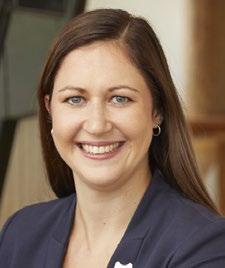
An avid runner, Albrecht has completed a marathon on the Great Wall of China, and is training for the Chicago Marathon.
As far back as Beattie Ashmore can remember, dating back to his upbringing in Greenville, he always wanted to be a lawyer. Today, he practices law as a principal attorney in the town he grew up in.
Ashmore started his career as a federal prosecutor and still focuses on matters in the federal court system. His practice consists of representing individuals and corporations in both criminal and civil cases.
“I’ve been fortunate with my law practice,” he said. “I’ve been involved in numerous state and federal trials, and having my own law firm with a dedicated staff gives me the ability to work hard and play hard.”
Ashmore believes it is also his duty to help others, regardless of area of specialty or even profession.
“I do a good bit of pro bono work in our magistrate’s courts and it’s a great opportunity to help those that are truly in need,” he said.
Shaheena Bennett is a self-described hometown lawyer who believes in protecting the rights of her clients at all times. Widely respected by her peers, she is well known as a zealous advocate.
Born and raised in Moncks Corner, Bennett founded the Bennett Law Firm in 2008. She focuses on personal injury and wrongful death matters, as well as entertainment and sports law, criminal defense, and civil litigation. She is also a certified mediator in the South Carolina Circuit Courts.


She considers her practice a mission to develop personal relationships with her many clients by providing a high level of service, and striving to achieve the best possible outcomes.

Bennett is a past president of the Berkeley County Bar Association and is active in a variety of bar organizations including the South Carolina Women Lawyers Association and the Black Lawyers Association.



From a young age, Christie Brimm had her eye on becoming a doctor. She’d been accepted into medical school when she took a philosophy class that changed everything.
“The critical debate and search for meaning and truth energized me,” she said. “When I enrolled in my medical school classes, that same passion was not there, so I left medical school on good terms, took the LSAT to keep my options open, and for the first time considered a career in law.”
Brimm practices solely in the areas of bankruptcy and debtor-creditor law. When Congress passed the 2020 Small Business Reorganization Act, Brimm was selected as one of only two attorneys in South Carolina to be a Subchapter V case trustee.






“I love what I do and I am so fulfilled in this practice area,” she said. “It is academically challenging for me, and I get great satisfaction from helping people in financial distress find a way forward.”

When Jennifer Burnett started out, she focused on defending nursing homes charged with abuse and neglect. Now, as managing partner at Harbin & Burnett, she practices on the plaintiff ’s side.
“I was interested in the medicine and enjoyed this type of litigation,” she said. “When I decided to switch sides to become a plaintiffs’ lawyer, I knew I wanted to represent families of loved ones who had been neglected or abused at nursing homes and assisted living facilities.”
Burnett recently completed a term as president of the South Carolina Association for Justice, a role she describes as the highlight of her career. She is also secretary of the Tucker W. Hipps Foundation, an organization that works to raise awareness of and prevent hazing.
She has also learned valuable lessons about leadership.
“I have found that the most successful leaders support and encourage others to excel in their contributions and that leadership is often more about enabling others to shine,” she said.
Nichole Davis grew up in a military family and lived all over the world, graduating from high school in Japan.
Watching “The Cosby Show,” she was fascinated with the show’s family matriarch, Claire Huxtable, an accomplished attorney, whose intellect, wit and eloquence sparked her interest in becoming a lawyer.
“The older I got, the more I realized that the law impacts everything and everyone, and I wanted to help people navigate the legal system and achieve their goals,” she said.
Today, Davis handles plaintiff personal-injury cases. For the last eight years, she’s organized a mock trial based on a fairy tale or Disney movie for children participating in The RAM Foundation Summer Enrichment Program. The most recent trial was based on “The Little Mermaid.”
“This is my way of making the system less scary for kids by giving them a positive experience and planting a seed that they have the ability to make the system better,” Davis said.
Ashley Creech intended to parlay her love of history into a career in higher education, but she pivoted to law school while enrolled in a graduate program.
“I enjoy working with clients, co-counsel, and defense counsel to understand how different perspectives inform a case,” she said. “I love the truth-seeking aspect of the law and have found that can bring my clients a lot of peace, despite some of the tragic circumstances they often face.”
Creech handles personal injury matters at McGowan, Hood, Felder & Phelps. She is vice president of the S.C. Association for Justice and is active in the American Association for Justice and the York County Bar Association.

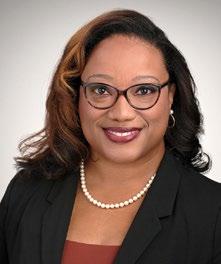

From her experience, Creech says she has learned that there are extraordinary people everywhere.
“I’ve also learned the importance of recognizing other people’s gifts,” she said. “And I understand that stepping back to allow them to use their gifts doesn’t diminish my own value or contributions.”
G.P. Diminich recalls spending summers in Italy, where he would visit family members who were attorneys. Their stories intrigued him and convinced him to pursue his career in the law.
“They were knowledgeable and entertaining, and worked in diverse areas from litigation to transactional law,” he said.
Diminich is the Charleston managing partner and wealth strategies regional service line leader at Shumaker, fpr which he represents high-net-worth individuals, corporations, and privately held businesses. He focuses on tax and estate planning and business and is a fellow in the American College of Trust and Estate Counsel.
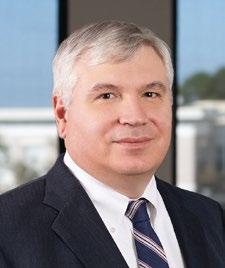
“I was drawn to this area because I enjoy the interaction between drafting documents and the litigation of the same,” he said. “It brings two wildly different skill sets together.”
Diminich says his clients and career have taught him to always go the extra mile and never give up.
“Many cases have turned on working hard and discovering critical information at the last minute,” he said.
As both a son and a grandson of attorneys, Franke Eppes can’t remember a time when he didn’t dream of becoming a lawyer. “I started going to court at about age 2 and began paying attention when I was 4 or 5,” he said. “I like helping people that need help and do not know where to turn.”A partner at Eppes & Plumblee, he focuses on complex litigation and criminal defense.

Yet even after a long and most successful career in law, Eppes still considers the awards he received for teamwork, spirit and sportsmanship in college as his top accomplishments. He is also a recipient of the Greenville Bar’s Tommy Thomason award, given to lawyers that exhibit a profound love and respect for the bar.
“If you do your best and do the job that is in front of you, you will get opportunities to do more without having to scheme for them,” he said.
Natasha Hanna can’t remember not wanting to be a lawyer.
“I was drawn to the excitement of solving problems and helping people,” she said. “That excitement still drives me today and I love what I do.”
Natasha Hanna Law in Myrtle Beach is a multi-faceted firm focusing on personal i njury, workers’ comp, criminal defense and courtroom litigation. On the other side of the office, the firm runs a real estate closing practice.
“These areas allow me to help our clients solve their problems as well as reach their dreams of home ownership,” she said.
Hanna says she loves giving back to her community and volunteers on a variety of boards.
“I currently serve as the vice chair of the Coastal Carolina University Board of Trustees, and I love watching the students come to our town to learn and succeed,” she said. “They motivate me to continue the hard work we do.”
Molly Flynn credits her self-described “gift of gab” and her parents, who are lawyers, with inspiring her to become an attorney.
“I determined that my love of public speaking, inability to shy away from confrontation, and logical reasoning skills could be put to good use as a lawyer,” she said.
As a civil litigation defense attorney at Collins & Lacy, she focuses on the retail and hospitality industry.
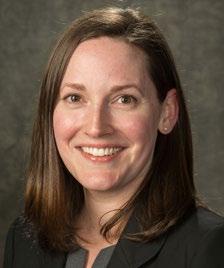

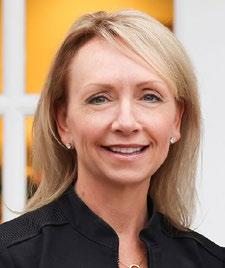
Flynn was previously an assistant solicitor in the 5th Circuit, where she prosecuted domestic violence cases and violent crimes, and served a two-year stint representing public school districts and state agencies. Those roles prepared her for her judicial post in Forest Acres, a place she has come to love. She credits local government officials for giving her the opportunity to serve.
“I never in my wildest dreams could have imagined I would be a judge,” she said. “I have been afforded this incredible opportunity and hope to continue as long as they will have me.”
Hannah Honeycutt was inspired to become a lawyer after she learned that public defenders and legal aid lawyers spend their careers working exclusively in service to low-income people.
After five years as a public defender, she is now executive director of the South Carolina Access to Justice Commission.
“As a public defender, I was often frustrated that I couldn’t help my clients with the myriad other things they needed, including accessing civil legal services,” she said. “Working for the Commission means I have a more systemic impact in making our justice system more accessible for everyone.”
Honeycutt takes particular pride in the Statewide Civil Legal Needs Assessment, an 18-month long research project that yielded a report about the legal needs of low-and-moderate-income people and how they access justice.
“For the first time, we have hard data to not only illustrate exactly what the problems are here, but also to support meaningful, data-driven solutions,” she said.
Jennifer Johnsen is passionate about giving back to her community and has been deeply involved in United Way of Greenville for 30 years.
From volunteering to serving on the organization’s board, she appreciates the organization’s mission of providing individuals with education, financial stability and basic needs.Her service also gives her an opportunity to lead and influences her perspective on leadership.
“Leadership is not about the leader, rather it’s about empowering those around you to achieve their greatest potential,” she said. “It’s about building strong relationships, providing inspiration and guidance, and motivating performance.”
Johnsen, a partner at Gallivan, White & Boyd, focuses her practice on insurance coverage and also practices ERISA and commercial litigation.
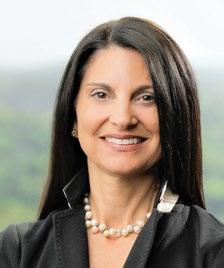
Starting out, she thought she’d be a transactional attorney, but later found her passion for litigation.
“Practicing law allows me to use my strongest skills, reading, analysis, problem-solving and communication, and I have discovered I love trial work,” she said.
Asmall-town lawyer in Mike Kelly’s hometown of Emporia, Va. inspired him to pursue his own career in law, and he has never looked back.
“I started working in his office while in high school and college, and I decided that was what I wanted to do,” Kelly said. “I still love the practice of law to this day.”
Kelly focuses on social security disability and workers’ compensation, and has become a leader both in his profession and his legal community. He is a past president of the Richland County Bar Association and the South Carolina Bar, and is a past president of the South Carolina Chapter of the American Board of Trial Advocates.

“Some people think they are not qualified or comfortable being in a leadership role, and that has never bothered me,” Kelly said. “Have I been scared or afraid I would fail? Of course, but I keep on plugging and so far, so good.”
Mark Joye credits his father and his experience in the Boy Scouts for inspiring his dedication to helping his clients, colleagues and community. “My top personal accomplishment is saving a fellow lawyer’s life from the dangers of alcoholism,” Joye said. “He and I speak about this now at seminars around the state.”Joye and his wife set up a foundation to support many local organizations, and established a college scholarship for high school students in Charleston County.
He handles personal-injury cases at his firm, which is a strong community supporter and has given over $250,000 in college scholarships to students across the state.
He recently prevailed in a federal case on behalf of a local charity after an insurance company failed to pay a fire claim on a school building for low-income kids in North Charleston.
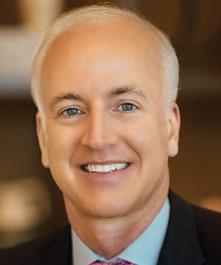
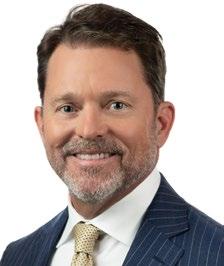
“I represented the school for free,” he said. “The multi-million-dollar settlement was my most satisfying settlement in 33 years of practicing law.”
Tom Killoren credits his father with setting a powerful example and inspiring him to practice law.
“My father is the best lawyer and person I’ve ever known,” said Killoren, who practices personal injury at KD Trial Lawyers in Spartanburg.
Killoren’s penchant for using his practice to help people spills over into his community service. He volunteers with Habitat for Humanity, and along with the opportunity to lend a helping hand for those in need, he enjoys the manual labor that comes with it.
“The feeling of immediate satisfaction of painting or landscaping is a good feeling, especially for those needing assistance,” he said.
When it comes to successful leadership, Killoren believes strong organizational skills is key.
“A well-organized plan can move a case or a project quickly and efficiently,” he said.
And a fun fact that Killoren’s colleagues may not know: His son played high school basketball with NBA star Zion Williamson of the New Orleans Pelicans.
Technology is in Doug Kim’s soul.
Kim parlayed his role as a systems engineer into a thriving intellectual law practice. As computers began making their way into the business world of the ‘90s, Kim noticed a knowledge gap in the legal profession. In 1995, he determined a lawyer with a technical background could have a promising future, so he went to law school.
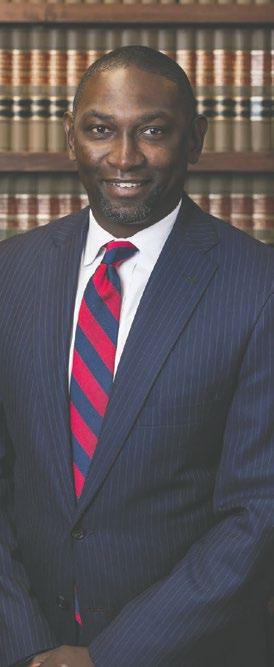
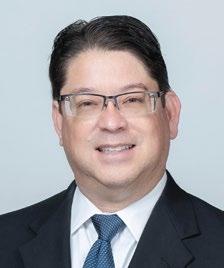
“My hunch proved correct as the world became increasingly technical,” he said. “In 1998, the U.S. Supreme Court ruled that software could be patented, which opened the floodgates for opportunities in this field.”
The founder of Kim, Lahey & Killough Law Firm in Greenville, Kim has a passion for entrepreneurship. He participates in organizations like InnoVision, NEXT, SC Launch, The Hill at Furman, and Clemson University Research Foundation to support entrepreneurs.

“These organizations benefit from volunteer support, which helps them thrive and expand,” he said. “Creating these connections are crucial for young businesses.”
Becky Laffitte has parlayed her long and distinguished career into a life of service to both the legal profession and her community.

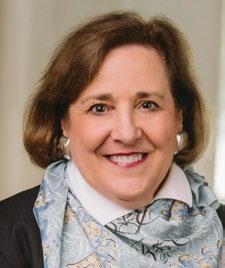
Her numerous professional affiliations include membership in the National Academy of Distinguished Neutrals. She is also a fellow of the American College of Trial Lawyers and the Litigation Counsel of America, and is a certified mediator and arbitrator.

Laffitte has a diverse litigation practice and participates in Robinson Gray’s 20 Years Strong Service Project. She says her career and leadership roles have taught her that “words and actions reflect who you are, and a leader should adhere to their moral principles, values, integrity, honesty and trustworthiness in inspiring others to reach their full potential.”
Her career path has included a variety of destinations. About 25 years ago, as president of the Junior League, she met style icon Martha Stewart at a league event, and was invited to Stewart’s farmstead in Connecticut, where she toured her recording studio, gardens and chicken coop.
As a partner at Riley, Pope & Laney in Columbia, Roy Laney runs a successful practice that focuses on commercial transactions and litigation. But he is equally passionate about pro bono work, finding immense reward in working on parole issues and real estate matters, as well as assisting small businesses and families who need a helping hand.
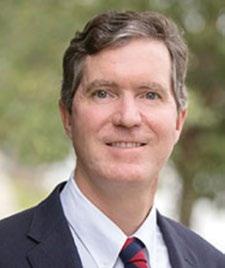
“Many of these cases seem small, but they’re big issues to the people involved,” he said. “Providing pro bono service to those who need help is probably the best thing I’ve done.”
Laney is president-elect of the South Carolina Supreme Court Historical Society and serves in the American Bar Association House of Delegates. He is a past president of the South Carolina Bar and the Richland County Bar Association.
“I try to listen, gather information and facilitate the discussion to generate as many ideas as possible,” he said. “Once decisions are made, it’s important to develop an action plan to ensure those ideas are implemented.”
PerryMacLennan credits his parents with planting the seed that led him to his career in law.
“My parents thought I would make a good lawyer because I argued with them so much,” he said. “And most of the people I considered important and successful when I was growing up — politicians, CEOs, local community leaders, were all lawyers, so I thought there must be something to it.”
MacLennan practices in employment law and economic development. He particularly enjoys assisting nonprofit organizations with employment law matters at discounted rates or pro bono.
He enjoys giving back to his profession and has held leadership roles in the South Carolina Bar and American Bar Association Young Lawyers Divisions.
For MacLennan, authenticity and setting good examples are hallmarks of leadership.
“Those in leadership positions must exemplify the characteristics that you want others to emulate,” he said. “But you must be yourself and strive to be the best version of yourself.”
Angus Macaulay considers the legal profession “the family business.”

“My grandfather was a lawyer in the small town of Chester and my father was a lawyer in Richmond,” he said. “There’s one uncle, three first cousins, a brother and sister, and they’re all lawyers,” he said.
Macaulay is a shareholder at Maynard Nexsen in Columbia, where he represents employers in litigation and gives them advice on current laws and how to apply those laws in their workplace. He is also a certified mediator.

As South Carolina Bar president from 2012-2013 (and still an active member today), Macaulay perceived early on that there can be too much of a good thing — he says the greatest leadership lesson he learned was to limit meetings to one hour.
“I was president of the organization and noticed that attendance was going down,” he said. As soon as I announced that the meetings would only last an hour, attendance skyrocketed.”
The opportunity to help people inspired Danielle Metoyer Mitchell to pursue a legal career. She credits her parents and great uncle for recognizing her strengths and passion for favoring the underdog and they encouraged her to become a lawyer.
Mitchell is a partner at Mitchell Ramseur where she practices family law as a litigator and mediator.
“I am drawn to advocating for people’s most fundamental needs, such as protecting their children, and to facilitating agreements resolving the legal aspects of family issues,” she said.
Active in her profession and her community, Mitchell volunteers on the Board of Trustees at Saint Joseph Catholic School of Greenville and serves as a mediator with the Upstate Mediation Center, and with the Upstate Fatherhood Coalition. Leading and volunteering are vital to her call to service.
“Being a leader is not the same thing as being loudest,” she said. “An effective leader can listen, guide, and help people get themselves going in the right direction.”
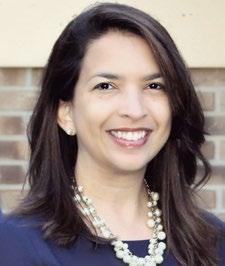
Stephen Mitchell took his father’s advice when it came to following him into the law.
“My father used his law degree to help run the family business and encouraged me to enter private practice,” he said. “He said it would give me more options and he was right.”
Today, Mitchell is managing partner of Fisher Phillips’ Columbia office.
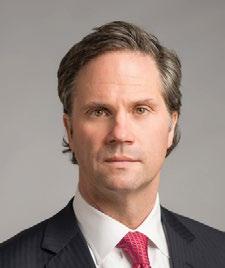
He says sheer luck led him to practice employment and labor law. After starting his career as a solicitor in Greenville County, he had an opportunity to work with a top labor firm that needed a young attorney with trial experience.
“The firm partners were patient and taught me labor and employment law,” he said. “It’s a fascinating area of the law.”
For Mitchell, being a leader means being direct and open with colleagues.
“I think you also need to accept that you will make mistakes and should be willing to own them and adapt, and often apologize,” he said.
An athlete, military officer and attorney, Stanley Myers’ career has been groundbreaking on multiple fronts.
A graduate of the Citadel and the David A. Clarke School of Law, Myers completed the 64th Military Judge Course, becoming the third military judge for the South Carolina Army National Guard, and the first African American to hold that position in South Carolina.

Myers practices in a variety of areas including personal injury, workers’ compensation, criminal defense and military law. He is a fellow of the American College of Trial Lawyers and the American Board of Trial Advocates.
He says that he’s learned that recruiting, training and trusting his staff enables him to effectively delegate duties, and he strives to avoid asking them to do anything he would not do himself.
“I’ve also learned to realize I’m only human and to be gentle on myself, but to also make no excuses and own my mistakes,” he said
Growing up in Kingstree, Leah Montgomery was impressed with the attorneys she viewed as essential to business and often community leaders.
“I knew I wanted to influence change in my home state that I love so much, which led me to study political science in college with the goal of pursuing a career in law and public service,” she said.
She launched Palmetto Legal Solutions in 2016 to feed her passion for advising small businesses on employment law compliance and business law issues.
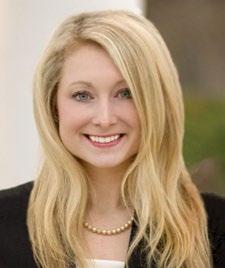
During Montgomery’s second year in law school at the University of South Carolina, she overcame serious health issues and graduated with honors.
“I had two heart procedures and considered taking a leave of absence but decided to remain an active student,” she said. “This experience taught me that I could not only persist through a difficult situation, but with hard work and focus, I could be successful.”
After earning her college degree in psychology, Bhumi Patel thought she’d get a paralegal certificate and work at a law firm. But her husband encouraged her to go to law school instead.
“He must have recognized something in me that I couldn’t see in myself,” she said. “My desire to succeed is often motivated by a good challenge, and I am thankful for the way he challenged me.”
Patel is a partner at Burr & Forman, where she practices real estate law. She recalls graduating from law school in 2008 during the economic recession when legal jobs were scarce and started her career doing foreclosure work for a bank until the market picked up.

As vice president of the South Carolina Women Lawyers Association, Patel believes good leaders must also be good listeners.
“Leadership means recognizing the strengths and abilities in others and encouraging them to use those for their personal and professional growth,” she said.
Mike Polk started his career in the Navy. Upon his discharge, he enrolled in law school at the University of South Carolina and later settled into the Midlands region, where he began practicing law at the Belser Law Firm.
Over his 25-year career as an estate and probate attorney, he has helped countless clients plan for their future.
Polk constructs wills and trusts, and set up powers of attorney, as well as probate administration and litigation. He also helps families seek the appointment of a guardian or conservator for those without estate planning documents. He has also served as an administrator and conservator in special circumstances.

In addition to his estate practice, Polk assists with business formation, planning and disputes, and he helps creditors assert their rights in state, federal and bankruptcy courts. He has appeared at virtually every level of court in South Carolina.
Polk is president-elect of the Richland County Bar Association and serves on its executive committee.
Wen she turned 50, Mary Sharp set aside her fears, took the plunge, and started her own personal injury practice. Six years later, the Sharp Law Firm in Beaufort is thriving.
Sharp, a certified mediator who serves as a municipal court judge, is active in a variety of professional and community organizations, including the South Carolina Bar House of Delegates, the South Carolina Access to Justice Commission, and the South Carolina Supreme Court Historical Society. She is past president of the South Carolina Bar and has learned valuable lessons in leadership from her experiences.
“I have learned that it is most important, when leading an organization, to keep focused on the long-term goals of the organization, and to not get side-tracked with distractions that don’t further those goals,” she said.
Sharp also enjoyed an early career in the movies. She was an extra in the movies Bull Durham in 1988 and Forrest Gump in 1994.
As a teenager, Carmen Scott was inspired to pursue her legal career after observing a system that places financially vulnerable individuals at a disadvantage and equates financial means to power.
Today, she primarily represents plaintiffs in pharmaceutical and medical device litigation.
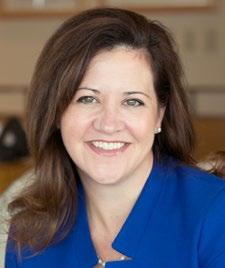

She also advocates for human trafficking victims against hotel franchises and other corporate entities accused of enabling trafficking.
“Representing human trafficking victims became part of my practice as the inhumanities inflicted on them made their way to my desk,” she said. “I am fortunate to work in a firm that allows me to pursue justice for individuals when there is a need.”
Scott has also volunteered for the Make-A-Wish Foundation for 16 years and views teamwork as a critical component of leadership.
“I value relationships, particularly with younger lawyers with whom I work,” she said. “I know it is important to leave the ladder down for those behind me so that they can likewise achieve their professional goals.”
Since his childhood, Skip Utsey has enjoyed studying logic. That, combined with a heart for life’s underdogs, set him on a path to the law.
A partner at Clawson Fargnoli Utsey in Charleston, Utsey focuses on insurance coverage issues, medical malpractice, appeals, and other personal injury matters. He is also chancellor (legal counsel) for the Episcopal Diocese of South Carolina.

“I have been fortunate to handle all kinds of litigation in my career,” he said. “I like helping people and providing them peace of mind, even if it sometimes means telling them something they didn’t want to hear.”
He values the successful roles he has played in several appellate decisions.
“I am proud of the fact that I was one of the people who helped clarify the law or create new law in a way that not only helped our clients, but will benefit others who may find themselves in similar situations,” he said.
At Land Parker Welch, the attorneys and staff treat clients like family, according to partner Ricci Land Welch.

As her firm’s website attests, Welch believes practicing law in a close-knit community requires a special touch.
“We’re a small-town practice and we run into our clients when we go to Wal-Mart or the grocery store, so we try to be accessible,” Welch writes. “Most of us don’t screen our calls in the office and we call people back as soon as we can.”
Welch, who is the daughter of firm founder John C. Land III, joined the firm in 1996.

Just after joining the firm, she was co-counsel to anti-discrimination lawyer Morris Dees in a high-profile hate-crime case, Macedonia v. Christian Knights of the Ku Klux Klan, in which the defendant organization and several individuals were found guilty of burning the Macedonia Baptist Church in Manning.
““I really like helping people and I truly enjoy my work,” she said.
“Perhaps becoming a lawyer was just meant to be,” she said. “Law is also a great mix of many of my interests, including reading, writing, and problem-solving.”
The Greenville native is a shareholder at Baker Donelson, where she practices business litigation, focused on healthcare.
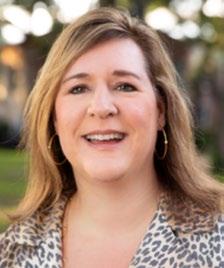
Wrenn is her firm’s Women’s Initiative leader for the Carolinas and serves as an editor of the Women’s Initiative’s quarterly newsletter, Strive.
“The Women’s Initiative aims to increase the representation of women in leadership positions at the firm, create diverse attorney teams for clients, and improve career development for women attorneys,” she said.
Wrenn believes leaders come in all shapes and sizes and lead in their own personal ways.
“In my experience, key to becoming a successful leader is being able to motivate and effectively help others feel valued, invested in, listened to, and appreciated,” she said.
From productivity to authenticity, David Wilson says he has learned valuable lessons throughout his career and is able to put them to good use in his HOA practice at Law Firm Carolinas.
“That which gets recognized and reinforced gets done, and that which doesn’t get recognized and reinforced doesn’t get done,” he said of productivity. “My career has been a source of great entertainment. I never know what I’m going to be working on from day to day, but it is always new and interesting.”
An Eagle Scout, Wilson devotes time to his church and provides emotional and spiritual support to those in need. When he’s not working, you might find him on a windy beach honing his surfing skills, especially during the hurricane season — his favorite time of year.
“I always look for hurricanes to hit the east coast so we can get some good waves,” he said.
With many of your clients and prospects working from home, now is a great time to engage them through a webinar.
Hosting a webinar is a powerful way to connect with your target audience,and with South Carolina Lawyers Weekly - you won’t have to worry about any of the logistics.
Whether you’re looking to move an in-person event online,or just need to generate quality sales leads,our team can help provide turnkey service from marketing to execution!
What is included in your webinar:
• 45-60 minute webinar
• Dedicated project support
• Email marketing
• Social media
• Print ad
For more information,please contact your account executive today.
$725,000 SETTLEMENT
Action: Apartment negligent security
Injuries alleged: Physical, mental and emotional injuries
Case name: Withheld Court/case no.: Withheld
Mediator: Kurt Rozelsky
Amount: $725,000
Date: June 23, 2023
Attorneys: Thomas M. Creech Jr. of Thomas Creech Law Offices, Greenville (for the plaintiff)
The case involved an assault of an apartment tenant by a trespasser on the premises of the apartment complex.
Through an extensive pre-suit investigation, plaintiff’s counsel was able to uncover evidence that the apartment complex knew or should have known about the presence of a trespasser and, after having such knowledge of the trespasser’s
presence, failed to confront, remove or call law enforcement to have the trespasser removed.
The pre-suit investigation further revealed that the apartment complex had a history of numerous law enforcement visits and violent crimes. Moreover, there was evidence that the apartment complex woefully lacked basic, reasonable safety and security measures. ◆
Action: Motor vehicle collision
Injuries alleged: Disc protrusion and an annular tear at L5-S1, disc bulge at C4-5, injuries to the shoulder and wrist, and a concussion.
Case name: Adam Chapman v. John Kuhn
Amount: $800,000 settlement and $159,251
special damages
Date: July 14, 2023
Attorneys: Mark Bringardner of Bringardner Injury Law Firm, Charleston (for the plaintiff)
Insurance companies: Progressive, Geico
On Oct. 29, 2021, a motorist was driving erratically on U.S. 17 in the West Ashley area of Charleston when he made a sudden, unsafe left turn into oncoming traffic and crashed into the plaintiff vehicle. The plaintiff said he suffered serious injuries to his neck, back, shoulder and wrist and that the other driver was negligent and reckless.
Due to the collision, the plaintiff suffered a disc protrusion and an annular tear at L5-S1, a disc bulge at C4-5, post-concussive symptoms and injuries to his shoulder and wrist. He underwent a course of conservative medical treatments, including physical therapy and various injections before undergoing an anterior cervical discectomy and arthroplasty surgery at the C4-5 level. ◆
t H e A ssoci A ted P ress
RICHMOND, Va. — A town government has agreed to independent reviews of misconduct allegations against its police force to settle a lawsuit filed after a Black and Latino Army lieutenant was pepper-sprayed during a traffic stop.
The town of Windsor, Virginia, also agreed to more officer training as part of a settlement agreement signed Thursday. In exchange, the state attorney general's office will drop its argument that Windsor police broke a new
law by depriving Caron Nazario of his rights.
The attorney general began investigating the town after a December 2020 traffic stop involving two Windsor Police Department officers and Nazario.
The traffic stop, captured on video, showed officers drawing their guns, pointing them at Nazario, who was in uniform, and using a slang term to suggest he was facing execution before pepper-spraying him and knocking him to the ground. He was not arrested.
Nazario sued the two officers involved in his encounter for $1 million in damages. But in January, a jury in Richmond mostly sided with the officers and awarded the Nazario a total of $3,685.
After investigating the traffic stop, then-Attorney General Mark Herring said his agency found it was part of larger problem with the department.
Attorney General Jason Miyares, who defeated Herring in a subsequent election, signed the settlement agreement with the town of about 3,000.•
Rebecca Laney Anderson has joined the Simpsonville office of the LawyerLisa firm. Her practice focuses on estate, life care and Medicaid planning.
Hannah J. Campbell has joined the Shumaker law firm of Charleston as part of its wealth strategies service line. Her practice focuses on estate planning, administration and litigation and on business creation and succession planning.
Three associates have joined the litigation practice of Cassidy Coates Price in Greenville. They are Cole Goode , Lillian K.H. Keeling and Garrett Simpson . All are members of the firm’s litigation practice.
Molly Sue Harmon has joined Robinson Gray Stepp & Laffitte in Columbia as an associate. Her practice will focus on workers’ compensation law. She previously served as a judicial law clerk for Circuit Court Judge R. Kirk Griffin in Sumter.
Kelly Reese has joined Robinson Gray as director of learning and organizational development. She will lead the firm’s professional development program, will work to maximize the firm’s personnel, technology and program resources, and, alongside the firm’s leadership, will work to further its focus on pro bono work and diversity.
Nicole M. “Nikki” Wooten is now of counsel at Maynard Nexsen’s office in Columbia. Her practice concentrates on state and local tax consulting and litigation, alcohol licensing and compliance, and appellate matters. Her previous practice includes serving as senior counsel with the South Carolina Department of Revenue.
Roe Cassidy Coates & Price of Greenville has completed a rebranding that includes a new firm name, Cassidy Coates Price . The firm’s members’ practices include general litigation, commercial and corporate banking, real estate, creditors’ rights, bankruptcy, governmental investigations and probate.
Henry “Buzz” Burwell , a partner with Nelson Mullins Riley & Scarborough of Greenville, was honored by the Japanese government on Aug. 26 when he was presented the Order of the Rising Sun, Gold Rays with Rosette. Burwell founded the Japan-America Association of South Carolina in 1988 and has served as its chair. At Nelson Mullins, he is a senior partner of the corporate, securities and tax division and co-leader of its international, sanctions practice, and defense industry practice groups.
Dalton B. Floyd Jr. , the senior partner of The Floyd Law Firm of Southside Beach, has been named one of “North America’s Best of 2023” by Who’s Who Publishing Group. His practice focuses on estate planning, wills, trust, and business, corporate, real estate and golf industry law.
John S. Nichols was presented the South Carolina Association for Justice’s Founders Award at the organization’s annual convention Aug. 5 in Columbia. He previously served as its president. A co-founder of Bluestein Attorneys, his practice includes professional responsibility and ethics consulting, litigation and trial support, and appellate advocacy.
Fred W. “Trey” Suggs III of Cassidy Coates Price of Greenville has
received the annual Worthy Adversary Award from the South Carolina Association for Justice. The annual honor recognizes a defense attorney who displays exemplary professionalism, honesty and ethical behavior in the practice of law. Suggs’ practice includes defense of health care professionals, business dissolutions, negotiation and litigation of contract disputes, enforcement and defense of noncompetition agreements, and complex business litigation.
Haley Saxby , an associate attorney with Robinson Gray of Columbia, has been accepted into the 2024 class of Leadership Columbia. The 10-month program offered by the city’s Chamber of Commerce provides opportunities for professional development, community involvement and networking. Saxby’s litigation practice focuses on premises liability, automobile torts, insurance coverage, and product liability.
The South Carolina Association for Justice has elected officers for the 2023-24 program year. Those elected, their positions and their law firms are Tom A. Killoren Jr. , president, KD Trial Lawyers; Sydney J. Lynn , president-elect, Joye Law Firm; Ashley White Creech , secretary; McGowan, Hood, Felder & Phillips; and Kevin Dean , treasurer, Motley Rice. The association advocates for those who are harmed by the actions of others and strengthens the justice system through education and action.
Submit notices for Lawyers in the News to Ross Chandler at rchandler@nclawyersweekly. com.
It’s been hot here. Not islands and West Coast on fire hot, but hot all the same. I blame the heat for recent events. Hard to explain the weirdness that is around us any other way.
The U.S. Supreme Court has been grabbing headlines lately, and not for the justices’ opinions — at least, not their official opinions. A long history of gifts from litigants appearing in front of the court is coming to light, and the light isn’t flattering.
I have only received an all-expenses paid trip once, back in college when a buddy and I won a Halloween costume contest. I can’t tell you what we were. I actually could, but I won’t. At that point in my life, I wasn’t concerned about declaring the prize on my taxes. To college me, tax returns usually meant a small refund anyway. Because of that, I don’t know the tax implications of free trips. Evidently, this makes me a candidate for the Supreme Court.
As a lawyer or a judge, appearances matter. The appearance of impropriety is enough to make most judges withdraw from cases. I recently had a case where three judges recused themselves because they knew one of the litigants. Not so in the Supreme Court, where the appearance of impropriety is an illusion. Like the alien fighting Men in Black, what we think we saw we did not see. (Is it a coincidence that they wear black robes?)
Only slightly more troubling than some justices’ character is their intellectual honesty. When your only job is to interpret the Constitution and you say it gives you a lifetime appointment, free of the checks and balances that rein in the other institutions of our gov-
ernment, it is troubling.
I am not a constitutional scholar, nor any other type of scholar for that matter. I remember the law student in my class who best understood ConLaw. He could be found daily, eating a pizza in the common area and going over his notes. He was happy to share his wisdom and debate the finer points of the Constitution with the rest of us, but he never shared his pizza. I like pizza a lot, but I have little stomach for discussions of what the Founding Fathers intended when they wrote the Constitution. My guess is that it was scratched out the night before it was due, much like most of my legal briefs. I give them credit for getting it done, centuries before spell-check or even erasers, and they did it in ink. Even so, I find it hard to believe that having left a nation ruled by an unelected monarch, the Founders would have empowered an unelected court to change the law with no recourse.
A recent Gallup poll found that less than 25% of Americans have faith in the Supreme Court. Do with that number what you will, since only about a third of Americans can
name even a single justice. Maybe this relative anonymity is the culprit behind the unreported gifts — certain justices don’t even know who they are and can’t be expected to do a stranger’s taxes.
Tax returns aren’t that difficult to get right. In fact, there is an entire profession of men and women who dedicate a good portion of their workday to filing tax forms for others. For a reasonable fee, you can hire one of these people, called an accountant, to keep you in compliance with tax laws. I know because I have had one doing my taxes for me for years. I am less of a household name than SCOTUS members, outside of my own home. Even so, I am not willing to bet that the Internal Revenue Service doesn’t know who I am.
There is an old proverb that a lawyer who represents himself has a fool for a client. One would assume that Supreme Court justices, having gone to law school and even practiced law, would be familiar with this proverb. Strict constructionists do not apply the proverb to accountants. It seems that justice is only blind to its own financial dealings.
Spencer Farris is the founding partner of The S.E. Farris Law Firm in St Louis. His column is made available by Missouri Lawyers Weekly.

The appearance of impropriety is enough to make most judges withdraw from cases. … Not so in the Supreme Court, where the appearance of impropriety is an illusion.
Continued From Page 5
great emphasis — and rightly so — on helping student-athletes build their own brand and market themselves, but not as much on educating them on how to protect themselves, negotiate, understand how deals and agents work, and what to be aware of.
“My point of view is more making sure that student-athletes are getting as much information as possible to become educated consumers in this new marketplace for themselves,” he said.
Mit Winter, an attorney with Kennyhertz Perry in Kansas City, Missouri, and a former Division I basketball player at the College of William & Mary, said that student-athletes often sign contracts without consulting an attorney or even another adult. He does not recommend that even for deals with low monetary compensation because even those deals can have serious, long-term consequences for the student-athlete.
“For example, many deals offered to athletes have very broad exclusivity provisions, term lengths and other provisions that often aren’t in the athlete’s best interest,” Winter said. “Some of these provisions can limit the types of deals an athlete could enter into in the future, even if they end up as a professional athlete.”
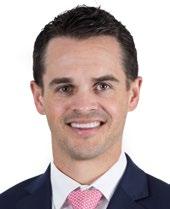
Winter said that NCAA rules prohibit most schools from providing legal services to their student-athletes, but that some organizations are working on solutions that will include free legal services for college athletes.
Palmer of Kaufman & Canoles said seeking out legal services is important because of the novelty and rapidly changing standards governing NIL in college and high school.

“Even after NCAA v. Alston and the passage of Virginia’s NIL legislation, we are witnessing all kinds of unique approaches and offerings for use of NIL,” Palmer said. “Many of these approaches and entities like NIL col-
lectives have found ways to operate in the gray area between state law and rules promulgated by enforcement bodies like the NCAA and VHSL (Virginia High School League).”
Many NIL deals are set up through collectives or third-party businesses usually formed by schools’ fans or boosters. These collectives create and support NIL opportunities for student-athletes, helping expose them to a variety of brands.
Visser said that her practice group at Varnum focuses on representing those collectives, higher education institutions and boosters.
“I would say the ‘NIL lawyer’ focuses on entity formations, forming collectives and the compliance aspect … as well as doing training for athletic department staff and coaches so when they’re presented with questions by student-athletes or boosters, they feel a little more comfortable answering those questions,” she said. “It’s also very heavy in contract law … just drafting NIL agreements between collectives, boosters, and companies and student-athletes.”
Visser, former in-house counsel with the University of Toledo’s athletic department, noted that she also spends a fair amount of time ensuring compliance with NCAA bylaws and recent guidance established by the Internal Revenue Service.

“Most collectives were formed as 501(c)(3)s in the beginning of NIL, and in some cases that might work, but in most cases, a collective isn’t going to fall into that exempt area,” she said.
Where so many individuals and entities have an interest in NIL — from student-athletes to coaches to
institutions and conferences — and where guidance is barebones and often not uniform, Sexton believes that lawyers are necessary in the relatively new and ever-changing world of NIL.
“Because of the differing laws and regulations at play, as well as the nature of the industry, I think it’s vital that conferences, institutions and athletes consult legal counsel to ensure that all NIL activity is in compliance with applicable laws, regulations and policies,” he said. “We keep them apprised of all relevant legal and regulatory developments, discuss best practices and provide other insights into the NIL space.”
William “Corky” Klett III of Burr & Forman in Charleston and Columbia, South Carolina, said that while the NCAA’s amateurism regulation has changed, the legal concept of NIL remains the same. As such, the change in NCAA amateur rules has simply opened a new category of potential licensors of student-athletes’ NIL.
“The good news for college athletes is that the world of NIL is not new at all, and attorneys have been handling the issues that the athletes, schools, collectives and endorsers are facing for decades,” Klett said. “College athletes and the various parties to their NIL deals benefit from the fact that we have been counseling in NIL transactions for many years, and there is, by and large, nothing different about these deals in the collegiate sports context.” ◆


















When students register for the paralegal studies program at Reynolds Community College in Richmond, Virginia, they will meet a multicultural cast of characters for a four-minute online orientation.

In the real world, an orientation video like this would have taken weeks to create. But Melissa Brooks, an associate professor and the paralegal program director, has used artificial intelligence to create a dream team of robots that are as lifelike as humans.

AI is on the rise in many aspects of the way we live, work and play. Brooks is using the
platform to enhance the way her students learn.
“AI in its best form can help humans do their jobs better and serve as a tool to advance the idea of working smarter, not harder,” she said. “It’s no secret that higher education is under-resourced and faced with challenges, and I thought artificial intelligence could help me in the classroom.”
At the college, Brooks is a one-woman band. As an instructor and head of the paralegal program, she is the only full-time faculty member and wears many hats. She counts on using AI as a teaching assistant.
She also views AI as a way to advance diversity, equity and inclusion in her classes
and help students relate to their studies in a way she cannot master alone.
“I identify as a white middle-class woman, and because I play so many roles in the program, I didn’t want students to hear only my voice and view only my persona all the time,” she said. “The idea that I could use artificial intelligence to help me diversify instruction was important to me as a teacher who is committed to diversity and inclusion in my personal pedagogy.”
Last summer, Brooks received a $1,500 innovation grant from the Reynolds Educational Foundation to enhance online learn-

ing in the college’s two-year paralegal degree program.
The program’s introductory video features a variety of avatars who take turns delivering friendly greetings to Brooks’ students. They are young, old, male, female, white, brown, and black. But Brooks says she’s not limiting her quest for diversity to race and ethnicity. Her goal is to create characters her students can identify with.
“I’m talking about diversity of age, experiences and upbringing, and that takes a lot of different shapes at a community college,” she said. “I have students who are 18 and right out of high school, and I have 67-year-old men and women who want to have a second act before they’re done.”

At the North Carolina Central University School of Law in Durham, Diane Littlejohn also is exploring the bridge between technology and the law.
Littlejohn, a professor at the law school, also is the executive director of the NCCU Technology Law and Policy Center and the managing owner and principal at Littlejohn Law Offices in Raleigh and Durham, where she practices intellectual property law.

In her law practice technology course, Littlejohn focuses on teaching students how to use technology for online research and e-discovery to enhance their careers, no matter where they choose to practice.
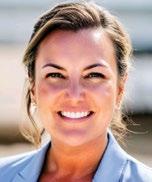
ChatGPT, a popular language model-based chatbot and Microsoft product, is part of her teaching arsenal. The coursework is geared toward creating effective prompts for legal research and letter writing that yield the best results.
“My students are learning the language
they use when crafting prompts yields different answers,” Littlejohn said. “So, I want them to see that while AI is a good tool, they must remember it may not generate their desired results.”
She also encourages students to be mindful of an attorney’s ethical obligations to their clients when considering how to use AI.
“You don’t want to put your client’s private information out there,” she said. “And while my students are impressed by AI, they are cautious about it, too,” she said.
To date, the state and national bar organizations are examining how this technology is used and its implications. At law schools, administration and faculty also are questioning how AI can be used without compromising academic integrity.



In an interview for an N.C. Bar Association article, Littlejohn explained how AI and truthfulness can co-exist.
“Some professors were concerned about cheating and plagiarism and about how it may influence the critical thinking of students,” she said. “Legal professionals and legal educators need to embrace it and work with it instead of working against it and put safeguards in place to protect academic integrity.”
In Brooks’ paralegal classes, she uses her AI tools to spark discussion and add liveliness to the dryer course topics.
She recalled a recent course on the topic of agency principal law, which addresses fiduciary relationships. She allowed that while it’s not one of the more exciting areas of law, it’s an important foundation for understanding business law, transactions and fiduciary responsibility.
“I fired up ChatGTP and prompted it to give us a problem that required us to consider the duties and obligations between an agent and a principal,” Brooks said.
The software generated a representative problem in seconds.
“I walked my students through that problem, and we made about a thousand arguments, and they were so engaged and excited,” she said. “We went 25 minutes over the lecture time, and at the end, I could just see the lightbulbs going off, and it was amazing.”
Across the legal profession, lawyers and paralegals have expressed concern that artificial intelligence will take their jobs, but Littlejohn’s students aren’t worried about that.
“AI can’t empanel a jury, and it can’t serve as a judge or try a case,” she said.
AI also can’t perform the personal tasks paralegals typically take on, such as performing customer service, expressing empathy or providing in-person support and feedback to attorneys in the office and the courtroom.
“I think we have to make sure we’re clear on what AI does and what it doesn’t do,” Littlejohn said. “AI does not think, and what it does do is essentially regurgitate information that it has already been fed from a data set.”
In 2021, a $5 million grant from Intel funded the NCCU Technology Law and Policy Center to help students become tech-savvy in their practices and understand technology as it applies to the law. The grant also provides summer internships for law students at Intel Corp. and mentoring, networking and scholarship opportunities.
The center offers a Certified Information Privacy Professional certificate program to give law students a broad-based education in the tech field and more marketable skills in tech law.
Like Brooks’ online paralegal program at Reynolds Community College, the center also seeks to diversify the legal technology
landscape and provide attorneys a career path they might not have considered.
“I think most attorneys come into law school thinking they’ll practice what they see on TV and in society in general, like personal injury, civil rights, criminal law,” Littlejohn said. “But you don’t see much about tech law, which could be a lucrative path for them.”
She predicts technology-related practice areas such as intellectual property, privacy and copyright will expand as artificial intelligence becomes more prevalent.
Brooks says she became interested in artificial intelligence about seven years ago when she taught a class on the stock market and asked her students to look for companies to invest in. A few gamers in her classroom discovered Nvidia, which made artificial intelligence computer chips for video games and was a rising star in the AI world. Later, Nvidia spun off Synthesia, an AI text-to-speech bot tool. After noticing Synthesia on Instagram, Brooks used her
content with its software without realizing its connection to the company her class had invested in back in 2016.
“I remember thinking the way they were using AI to make training videos was so cool, and I realized we could use it as an education tool, too,” she said.
She uses the AI application to create fresh course material by setting forth her learning objectives, the tone she wants to present and other data. The software uses these data points to generate a script, which she edits.
“It’s incredible and so exciting,” she said. “What would take me an hour now takes me four minutes, and it is better than the work product I could have done on my own.”
Littlejohn and Brooks believe their use of technology in teaching future lawyers and paralegals to improve efficiency and enhance their jobs in the real world will help enhance access to justice.
After all, the law and policy center is committed to producing lawyers who will

use technology in alignment with the law school’s mission to facilitate the efficient, effective and ethical practice of law and increase the access of legal information and services to underserved communities.
At the community college, Brooks also believes that by increasing her students’ comfort level with technology, they’ll use it to build efficiencies, which might lead to less expensive legal options for clients with limited means.
She’s gathering feedback from her students that will influence how she uses the bots to deliver education going forward, and she believes that AI can make a positive difference in the legal profession and society as a whole.
“I believe if educators are willing to use the power of artificial intelligence for the common good and are committed to that intention, AI could be a dynamic and innovative tool that enhances lives for the better,” she said. ◆
Catesha Hargro’s career has been a long and winding journey, but she has never lost sight of her career goals. She is a paralegal for cbdMD, a company that sells CBD products.
She grew up in Charlotte and after graduating from high school was one of the first students enrolled in the paralegal program at Central Piedmont Community College in 1988. But she dropped out when she started her family and didn’t return for 23 years. She has two sons. One has autism.

Hargro went on to earn a Bachelor of Arts degree in government and political philosophy while working full time at blu, a Charlotte e-cigarette company.
“I was one of the original employees
at blu, and the founder, Jason Healy, was flexible enough to allow me to come in early, work until 10:30 a.m., leave and attend classes and return around 2 p.m.,” she said. “During some semesters, I had night classes, and there were some challenging moments along the way.”
She enrolled in the Master of Jurisprudence program at Loyola University School of Law, majoring in compliance and enterprise risk management program.
“Because of the COVID pandemic, I defended my thesis on a Zoom call, something I will never forget,” she said.
She has over 10 years of experience working in a start-up environment with highly regulated consumer goods.
A typical day: “My official title is regulatory paralegal, but our HR man-



n Association presents Riddle its Distinguished Paralegal Award
Katie Riddle has received the N.C. Bar Association Paralegal Divison’s Distinguished Paralegal Award.
Riddle is a paralegal at Lincoln Financial Group and a second-year evening law student at North Carolina Central University School of Law, where she serves the Student Bar Association as an evening representative and is the secretary for the Trial Advocacy Board.
In 2022, she was awarded the Outstanding Paralegal Pro Bono Award for her community service and pro-bono work. She was inducted in the North Carolina Pro Bono Resource Center’s Pro Bono Honor Society for Paralegals for 2021 and 2022.

n LM Title Co. hosts Parapalooza event
e LM Title Co. will hold Parapalooza, a daylong seminar for real estate paralegals, title searchers, legal assistants and sta , in the fall. e event, which o ers ve continuing paralegal education hours, takes place Oct. 10 at the Royal Banquet and Conference Center in Raleigh.
LM Title is a subsidiary of Law-




yers Mutual Liability Insurance Co., which was created to serve the real estate bar in North Carolina. For information, visit lmtitle.com.

n NALS annual meeting honors Wolfe, Friedrich Traci Wolfe, president of the Legal Sta Professionals of South Carolina, and Alma Friedrich, founder and president of NALSNC, were honored at the 2023 convention of the National Association of Legal Support Professionals on Aug. 23 at Houston.
Wolfe, a family law paralegal at Burnette Shutt & McDaniel of Columbia, S.C. was a nalist for the NALS Award of Excellence. She has been a NALS member for ve years and has led the Mem-

bership and Marketing Committee. She was the 2022 conference chair when NALS convened in Charlotte.
Friedrich is a litigation paralegal at Poyner Spruill in Raleigh. She launched the North Carolina Chapter of NALS in 2021 and serves as its founding president. She received the NALS Volunteer of the Year Award

• With more than 150 combined years of title experience, our title attorneys and legal support team provide timely underwriting assistance to approved NC real estate attorneys.

• Solution-driven and responsive, our team addresses questions about residential and commercial transactions, helping you provide better service, increase productivity, and mitigate risk.
• Investors Title stays informed about regulatory changes and compliance issues that may affect your legal practice.
• We research, develop, and share best practice solutions for maintaining a secure and compliant real estate office.
• We consistently advocate on behalf of approved attorneys through our work with the Real Estate Lawyers Association of North Carolina (RELANC) and directly with the state Legislature.
• Residential & Commercial Title Insurance

•Commercial Escrow & Disbursement Services
• Trust Account Reconciliation
•§1031 Like-Kind Exchanges
• Investors Title’s in-person and online educational programs are unmatched in terms of quality and relevance.
• We provide thousands of hours of CLE/CPE credit every year to our attorney/ paralegal base.
• Visit invtitle.com/resources/nc for comprehensive resources and to access on-demand content.
n Continued from Page 33
ager didn’t think it fit what I do so we changed it to senior corporate paralegal. It’s difficult to find an appropriate title in a start-up environment. There are only three people in our department, the general counsel, the senior vice president of regulatory and me. My role touches all areas of the law. I reach out to state officials to ensure we are compliant because we don’t have federal guidelines regulating our products. I also handle general paralegal work in the office, redlining agreements, maintaining and updating templates, reviewing marketing materials, responding to outside counsel requests, and working with the IP attorney. I am the project manager for the legal team.



I depend on Jira to keep up with all the varied requests. I also manage the entity work, anything involving the secretary of state’s office, including apostilles, certificates of free sale, annual filings.”


Greatest rewards: I enjoy finding workarounds. We operate in the grey area most of the time given our unregulated status. This makes it easy for potential partners to decline working with us or ask us to re-engage after the FDA or Congress has created federal guidelines. I find the path forward using the structure and guidelines we already have for other products. In a lot of cases, we are successful.
Staying organized: I am a big fan of the calendar in Outlook. I use the tasks list, and I attach Jira tickets with
reminders when necessary.

In my spare time: I love to travel. In my younger years I didn’t think I would have the time or money to travel. It has been a great joy to check off bucket-list destinations.
I’d love to meet: Pricilla, the evangelist who traveled with Paul. She is listed among the 70 disciples and is believed to have written the epistle to the Hebrews. Women have been successfully removed as figureheads in the church for such a long time, and yet the Apostle Paul mentions Pricilla six or seven times, and this is after the text removal in the King James version. I imagine women were very prominent in the founding years of the Christian church. ◆



In recognition of the ever-growing importance to deliver news in the most engaging way, we’ve revamped sclawyersweekly.com. You’ll find a more focused approach to today’s top stories and improved navigation, resulting in higher engagement on our site. This revamp also brings new advertising and marketing opportunities that connect businesses to decision-makers in the industry.


